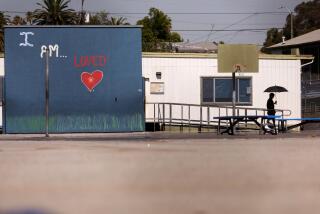Study Cites Schoolroom Toxin Risks
- Share via
CANYON COUNTRY — Children who attend school in portable classrooms may be at higher risk of exposure to cancer-causing toxins, according to a report released Thursday.
More than 200,000 students in Los Angeles County--and 2 million statewide--now attend class in the portable prefabricated buildings, largely because of class-size reduction mandates, according to the Environmental Working Group, which released the report.
The study, based on tests and scientific literature, found a child’s lifetime risk of cancer may be two to three times higher than federally accepted levels because of formaldehyde and other chemicals used in construction of prefabricated buildings, said Bill Walker, California director of the Environmental Working Group.
Inadequate ventilation contributes to the problem, he said.
Based in Washington, the nonprofit Environmental Working Group was founded in 1993 and provides research for environmental advocacy groups.
The group is calling for greater regulations over the industries that make portable classrooms, mobile homes and manufactured housing.
The report was released at a press conference at Rio Vista Elementary School in Canyon Country, where one portable classroom has been vacant since April after several students became ill.
Following the reported illnesses, workers discovered that ventilators in the new classroom, installed this year, had not been opened. Tests by a private firm found no unusual levels of airborne contaminants, district officials said. The tests were ordered by the Saugus Union School District and conducted after the portable was ventilated.
Saugus trustee Judy Umeck said officials “are going above and beyond to find out all that can be done” to resolve problems with classroom air quality.
“We are continuing to investigate every corner and we will adopt a policy to see that it does not happen again,” she said.
At the press conference Thursday, the mother of one youngster tearfully described how her 10-year-old son has been too ill to attend school since February, sleeping much of the day and suffering from other symptoms. After months of tests, the youngster’s ailments were diagnosed this week as “chemically induced immune dysfunction,” said the mother, Laura Scott of Canyon Country.
“He came home the very first day [of the spring semester] with terrible allergy symptoms,” said Scott, whose son, Aaron, is a fourth-grader at Rio Vista. “He couldn’t breathe and he had unexplained bruising on his legs. By the end of three weeks, there was no doubt in my mind that it was something at the school. Aaron would just come home like a zombie.”
Aaron has been out of school since Feb. 18 and is still recovering, Scott said. “His immune system has been compromised,” she said.
“We’re talking about hundreds of thousands of kids who may be affected across the nation,” said the boy’s pediatrician, Dr. Rochelle Feldman, who said she is treating about six other youngsters, some from other schools, who have similar ailments. Feldman warned many physicians may not be aware of allergic symptoms that could be triggered by toxins in portable classrooms and other manufactured housing.
“I don’t want parents to get freaked. If the kid doesn’t have symptoms, don’t worry about it,” Feldman said. “But if a kid has symptoms of allergy, headaches, nausea, etc., call a pediatrician and get some kind of screening” for toxic poisoning.
Achva Stein, an environmental architecture professor at USC, said it is well known that toxins are found in portable classrooms “because of the material inside that they use.”
“It is part of the ‘sick building’ syndrome,” she said.
The Assembly is expected next week to vote on the Healthy Schools Act (AB 1270), written by Assembly Majority Leader Kevin Shelley (D-San Francisco). The measure calls for the state to study air quality in portable classrooms and to provide schools with training to ensure that portable classrooms are properly ventilated.
Los Angeles County supervisors also took action earlier this month, ordering county health officials to investigate complaints and to consider legislation for the construction and ventilation of portable classrooms.
More to Read
Sign up for Essential California
The most important California stories and recommendations in your inbox every morning.
You may occasionally receive promotional content from the Los Angeles Times.













